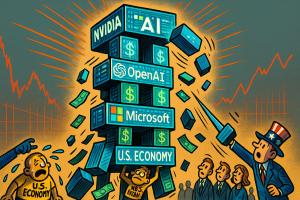Corporate media peddle the myth of a pre-Trump economic golden age, but for working-class Americans, especially Black families, the struggle began long before he took office.
Fareed Zakaria opened a recent episode of his eponymous CNN show with this assertion:
“When Donald Trump was inaugurated, by most measures, the United States was the strongest major economy in the world. Growth was robust, unemployment was at historic lows, inflation had fallen to a manageable level, and productivity, the elixir of economics, had picked up.
Trump took this booming economy and upended it with massive tariff hikes. Has anything like this ever been done before?
The answer to Zakaria’s question is an unequivocal “no” and neither is it happening now. The narrative favored by the legacy media, of Trump destroying a “booming” U.S. economy, is a comforting folktale that is wholly unsupported by either the facts on the ground or the experience of working people, African Americans least of all.
Monica Vincent’s view of the Biden economy is less sanguine than the talking heads in the newspapers and on the cable networks’ news programs. With two jobs—full-time as a medical technician at an assisted living facility in Gastonia, North Carolina, and a part-time gig at a local Little Caesars—the 34-year-old African American single mother is clear that her finances did not just begin to peter out when Trump was sworn into office for a second term in January.
“These jobs are trash,” she told Black Agenda Report in March. “I go to work every day of the week and me and my kids would be homeless if it wasn’t for my sister taking us in. I’m just barely getting by.”
She was evicted from her apartment six months ago when her landlord sold the property. The going rate for a two-bedroom apartment in Gastonia is about $1,300 and most landlords in the area require two months in advance, meaning that Monica would have to come up with $3,900 just to move in. That figure is roughly equivalent to her gross monthly pay.
Add to rent the cost of daycare, food, insurance, car repairs, gas and a light bill that typically sets her back about $300 a month.
The disconnect between Zakaria’s rosy assessment of the Biden economy and Vincent’s more dour summation boils down entirely to politics, specifically the liberal chattering classes’ reliance on cherry-picked and manipulated data that strengthens their case against Trump, and for the Democrats.
Unemployment figures are a prime example. Employers added 2.2 million jobs in 2024, an average of 186,000 a month, down sharply from the 3 million jobs created in 2023 but still relatively robust after the Federal Reserve raised interest rates 11 times between March 2022 and July 2023 to dry up inflation.
Despite the slowdown, the official unemployment rate continues to hover near 4%, just slightly above the full-employment threshold of 3%. The government’s jobless figures, however, do not reflect what Vincent and many low-wage workers say is the quality of jobs available today in a post-industrial economy that no longer makes much of value. Every president since Reagan has done his part to deindustrialize the economy with labor, banking and trade policies that favor speculation over production, and financiers over factory workers, creating a job market in which there are more fry cooks than millwrights and more DoorDash drivers than dockworkers. When adjusted for inflation, American workers have not had a substantive pay raise in more than 40 years. Joe Guzzardi, an analyst at the Institute for Sound Public Policy and author of a syndicated financial column told Black Agenda Report:
“American workers are getting the short end of the stick, especially African American and Latino immigrant workers. And these CEOs are not being honest about their struggles to find workers. If you really want to hire workers, then the tried-and-true formula is to raise wages, pure and simple.”
Moreover, politicians have been manipulating economic data since a deep recession cost President Jimmy Carter the White House in his reelection bid against Reagan.
The Bureau of Labor Statistics’ unemployment rate, for example, does not include discouraged workers– either long-term or short-term– who are not actively looking for jobs. As another, the BLS survey of employers’ payroll numbers does not differentiate between full-time work– such as Vincent’s job at the assisted living facility—and part-time work, such as her pizzeria job. By some measures, part-time jobs account for half of all jobs in the U.S., and nearly 30 million employees hold part-time jobs in the U.S., an all-time high number.
As another example, in the first six months of 2022, the U.S. recorded two consecutive quarters of negative growth in its gross domestic product, which has long been understood as the definition of a recession. Yet, under clear pressure from the Biden administration, the agency responsible for announcing a recession, the National Bureau of Economic Research, declined to do so.
It is not that Trump’s economic policies improve upon his predecessors in the White House. Indeed there is every reason to believe that his tariffs and deep cuts to the federal workforce will dry up even more the buying power that is the lifeblood of a consumer economy. A second Great Depression is not out of the question. But our economic woes did not begin under Trump; the country was already on the wrong path. Trump merely hit the accelerator.
Said Desjon Yisrael, a 35-year-old African American who sells work boots and drives part-time for DoorDash to make ends meet near Greensboro, North Carolina:
“It’s the gig economy. It really baffles me that people think that the economy (was) doing really well (under Biden). The conditions here in the Black neighborhoods … are (akin) to a slum. People are gathered around liquor stores in the middle of the day; I see a lot of homelessness, people are always asking me for change, and very little is being invested in our communities.”
Heterodox economists say that the media’s myopic fixation on the employment rate does not provide a complete snapshot. Some have compared it to a physician who only takes a patient’s temperature and declares him fit without scrutinizing his blood pressure, cholesterol, weight or breathing. Black homeownership for instance, is lower today than it was 25 years ago and the labor force participation rate for adult men has dropped from 8 in 10 in 1970 to about two in three today.
Additionally, pundits like Zakaria seldom mention that the Federal Reserve is theoretically mandated by law to strike a balance between maximizing corporate profits and minimizing unemployment. But in practice, the nation’s central bank is concerned only with the former, lowering to almost zero the interest rate at which banks borrow to help commercial institutions recoup their losses following the 2008 collapse of the real estate market. But when inflation began to rise, the Fed embarked on an aggressive policy of raising lending rates in an effort to subdue job creation and lower wages that economists often associate with inflation.
In that same vein, the prioritization of corporate profits has not only cut into employees’ wages but their leisure time as well. The booming economy that Zakaria describes is deeply exploitative. Monica Vincent estimates that she works 60 hours each week, cutting deeply into the time she would much rather spend raising her teenage daughter and 2-year-old son.
“If all you do is work, work, work, when do you get time to spend with your family?” she asked rhetorically. She has grown accustomed to telling her teenage daughter:
“I’m sorry that I can’t come to your play today, but Mom’s gotta work.”
She sighs and then:
“I thought a job was supposed to make your life better, not worse.”
In the final analysis, perhaps the best response to Zakaria’s description of a booming economy, however, is reality: if indeed the economy under Biden was booming, and only took a turn for the worse with Trump’s inauguration, then wouldn’t the Dems have won the presidential election in a walk?
Jon Jeter is a former foreign correspondent for the Washington Post. He is the author of Flat Broke in the Free Market: How Globalization Fleeced Working People and the co-author of A Day Late and a Dollar Short: Dark Days and Bright Nights in Obama's Postracial America. His work can be found on Patreon as well as Black Republic Media.















